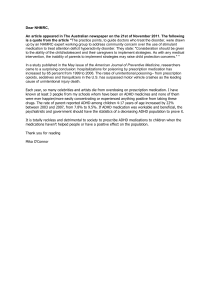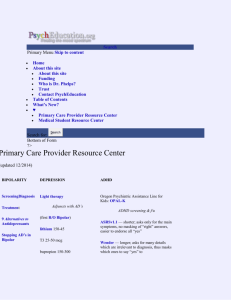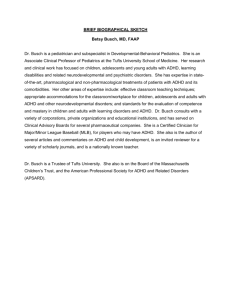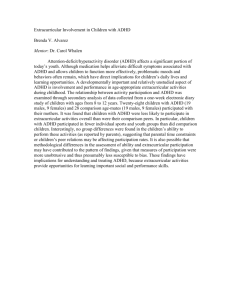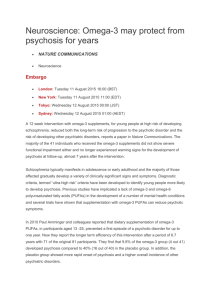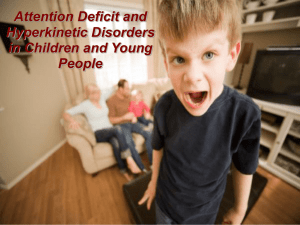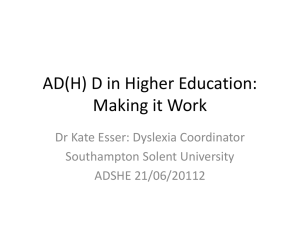Fish oil supplements - is there evidence that
advertisement
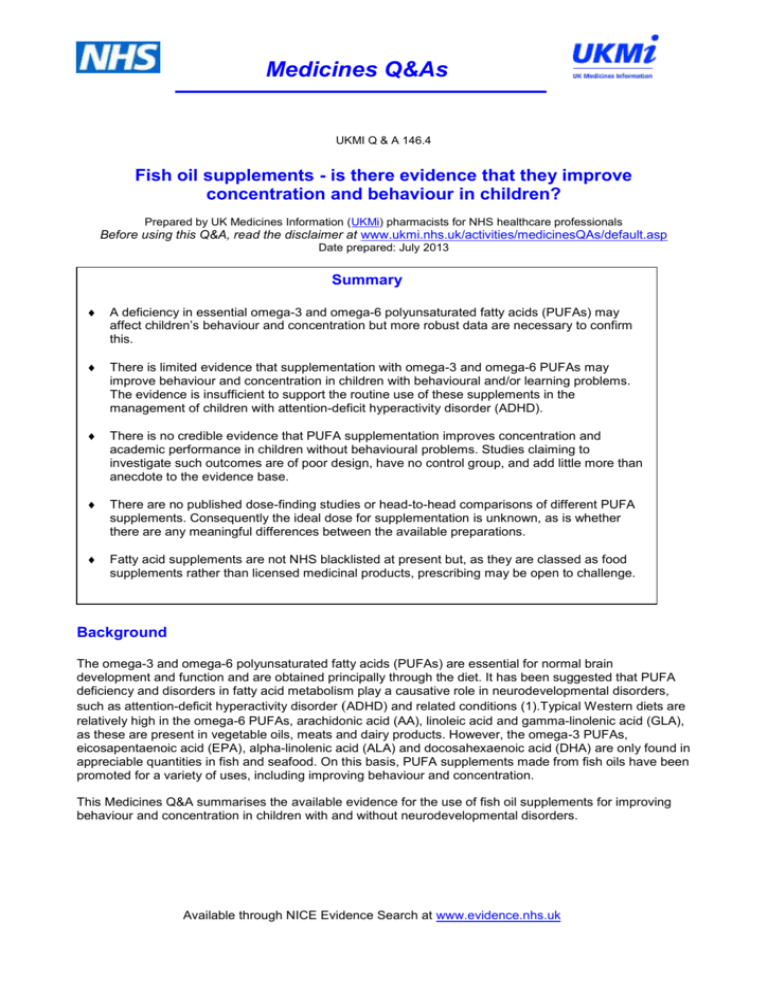
Medicines Q&As UKMI Q & A 146.4 Fish oil supplements - is there evidence that they improve concentration and behaviour in children? Prepared by UK Medicines Information (UKMi) pharmacists for NHS healthcare professionals Before using this Q&A, read the disclaimer at www.ukmi.nhs.uk/activities/medicinesQAs/default.asp Date prepared: July 2013 Summary A deficiency in essential omega-3 and omega-6 polyunsaturated fatty acids (PUFAs) may affect children’s behaviour and concentration but more robust data are necessary to confirm this. There is limited evidence that supplementation with omega-3 and omega-6 PUFAs may improve behaviour and concentration in children with behavioural and/or learning problems. The evidence is insufficient to support the routine use of these supplements in the management of children with attention-deficit hyperactivity disorder (ADHD). There is no credible evidence that PUFA supplementation improves concentration and academic performance in children without behavioural problems. Studies claiming to investigate such outcomes are of poor design, have no control group, and add little more than anecdote to the evidence base. There are no published dose-finding studies or head-to-head comparisons of different PUFA supplements. Consequently the ideal dose for supplementation is unknown, as is whether there are any meaningful differences between the available preparations. Fatty acid supplements are not NHS blacklisted at present but, as they are classed as food supplements rather than licensed medicinal products, prescribing may be open to challenge. Background The omega-3 and omega-6 polyunsaturated fatty acids (PUFAs) are essential for normal brain development and function and are obtained principally through the diet. It has been suggested that PUFA deficiency and disorders in fatty acid metabolism play a causative role in neurodevelopmental disorders, such as attention-deficit hyperactivity disorder (ADHD) and related conditions (1).Typical Western diets are relatively high in the omega-6 PUFAs, arachidonic acid (AA), linoleic acid and gamma-linolenic acid (GLA), as these are present in vegetable oils, meats and dairy products. However, the omega-3 PUFAs, eicosapentaenoic acid (EPA), alpha-linolenic acid (ALA) and docosahexaenoic acid (DHA) are only found in appreciable quantities in fish and seafood. On this basis, PUFA supplements made from fish oils have been promoted for a variety of uses, including improving behaviour and concentration. This Medicines Q&A summarises the available evidence for the use of fish oil supplements for improving behaviour and concentration in children with and without neurodevelopmental disorders. Available through NICE Evidence Search at www.evidence.nhs.uk Answer PUFA deficiency and learning or behavioural difficulties It has been suggested that children with learning or behavioural difficulties are deficient in PUFAs as demonstrated by low blood levels of PUFAs or by displaying symptoms of PUFA deficiency such as frequent thirst, polyuria and dry skin. However, evidence of a relationship between PUFA deficiency and learning or behavioural difficulties is limited. Authors of a systematic review summarising studies that assessed blood PUFA status in children (age 4 to 16 years) with ADHD concluded that the association between PUFA status and ADHD symptoms is insufficient to prove a causal relation (2). Evidence for supplementation PUFA supplements in children with ADHD Over the last 25 years there have been many studies which have investigated the use of omega-3 and omega-6 PUFAs in the management of behaviourial and learning difficulties in children, particularly ADHD. Results from these have been conflicting. Recently two meta-analyses and a Cochrane review have been published comparing the efficacy of PUFAs in treating the symptoms of ADHD in children and adolescents using data from published randomised controlled trials (3,4,5). The Cochrane review which included 13 trials with 1011 participants (aged up to 18 years) looked at a series of outcome measures; improvement in overall ADHD symptoms, parent-rated or teacher-rated overall ADHD symptoms, inattention and hyperactivity/impulsivity (5). Standardised mean difference (SMD) between groups was used as the measure of treatment effect.The included studies used a wide range of doses of omega-3 and omega-6 supplements given for periods of between 4 and 16 weeks. Five studies were of omega-3 supplementation only. Two parallel trials comparing omega-3/omega-6 PUFAs vs placebo reported improvement in overall ADHD symptoms (n=97; RR 2.19 CI [1.04 to 4.62]). There were no statistically significant differences between parent-rated: overall ADHD symptoms (5 trials n=413; SMD 0.17, CI [-0.38 to 0.03]), inattention (6 trials n=469; SMD -0.04 CI [-0.29 to 0.21]), or hyperactivity/impulsivity (5 trials n=416; SMD -0.04 CI [-0.25 to 0.16]) in participants receiving any PUFA supplement compared to those receiving placebo. There were also no statistically significant differences in teacher-rated: overall ADHD symptoms (4 trials n=324 SMD 0.05 CI [-0.18 to 0.27]), inattention (3 trials n=260 SMD 0.26 CI [-0.22 to 0.74]), hyperactivity/impulsivity (3 trials n=259, SMD 0.10 CI [-0.16 to 0.35]). Limited data from a subset of studies that compared a combination of omega-3/omega-6 PUFAs to placebo showed that there was a significant improvement in parent-rated overall ADHD symptoms (2 trials n=120, SMD -0.48 CI [-0.88 to -0.08]). The authors conclude that overall there was little evidence that fatty acid supplementation provides any benefit for the symptoms of ADHD in children and adolescents. The two meta-analyses each used a single outcome measure reflecting improvement in ADHD severity combining a range of different assessments undertaken by different raters (clinician, parent or teacher). Sonuga-Barke et al assessed a wide-range of non-pharmacological treatments including fatty acid supplementation (3). The outcome measure was the change in total ADHD symptom severity measured at the first post treatment assessment using results from validated ADHD symptom rating scales where available, questionnaire results and direct observations. Eleven trials were included (827 participants). The results were stratified into two analyses; the ‘most proximal assessment’ analysis which included data collected by the rater closest to the therapeutic setting and a ‘probably blinded assessment’ where the rater was likely to be blind to treatment. Treatment effects were significant for both analyses; proximal assessment (SMD 0.21 CI [0.05 to 0.36 p = 0.007] and probably blinded assessment [SMD 0.16 CI [0.01 to 0.31 p = 0.04]).The authors concluded that there was a small but significant effect of fatty acid supplementation on ADHD symptoms. Bloch and Quawasmi assessed omega-3 supplementation only reporting the difference in mean improvement in ADHD severity using validated ADHD symptom rating scales. Parent and teacher completed rating scales were included in the same analysis.Ten trials including 699 participants were included and showed a small but significant effect of omega-3 supplementation on ADHD (SMD 0.31 CI [0.16 to 0.47] p< 0.0001). The effect size reported in these meta-analyses is small compared with those for conventional drug treatments for ADHD such as methylphenidate (effect size 0.78, 95% CI [0.64 to 0.91]), and atomoxetine (effect size 0.64 [0.51 to 0.76]) (4). Available through NICE Evidence Search at www.evidence.nhs.uk Therefore although there may be some small benefit of omega-3 and omega-6 PUFAs for children and adolescents with ADHD there is insufficient evidence to support widespread use of such supplements. PUFA supplements in children without behavioural problems Durham County Council has undertaken a number of trials to assess whether fatty acid supplementation improves concentration in pre-school or secondary school children (6,7). The value of these trials has been questioned as none has a pre-specified control arm, and it is claimed that they are little more than a promotional exercise (8,9). The initial results of the pre-school trial have been published in the Daily Telegraph. In this trial, 65 children aged between six and 30 months took omega-3 PUFAs every day for five months and apparently made substantial progress with communication and social skills (7). Results from the study in secondary school children were published in a press release from Durham County Council. Over 3,000 Year 11 pupils were initially recruited and took daily PUFA supplements (eye q) to assess the effects on their academic performance (10). 832 pupils were still taking the supplements at the time of their GCSE examinations. Exam results were compared with 629 ‘matched pairs’ who hadn’t taken supplements. Pupils taking PUFA supplements achieved an average of 17.7 points more than those not taking supplements. This study has been heavily criticised due to its poor design and lack of scientific rigour (8). As yet the results have not been fully published. Reports of other non-controlled trials have also been published in the lay media. In May 2006 the Daily Mail reported that regular doses of Boots branded omega-3-fish oils improved numeracy, reading and writing skills in 34 eight to nine year olds (11). In March 2007 six UK newspapers reported that a supplement of fish oils given to four overweight children for three months boosted their brain development by three years (12). Such studies contribute little to the evidence base for PUFA supplementation. The eye q supplement which contains a combination of fish oils and evening primrose oil has been used in some of the larger trials. In 2008 the European Food Safety Authority (efsa) assessed the manufacturer’s claim that eye q “helps children maintain concentration levels” in the target population of healthy children aged 2 to 18 years old (13). The panel concluded that this claim could not be substantiated. Adverse effects There have been few reports of adverse effects associated with PUFAs in published trials. However, fish oils can cause gastrointestinal disturbances and may increase bleeding time and adversely affect the metabolic control of patients with type 2 diabetes mellitus, although type 2 disease in children is rare (14). National Guidelines The Scottish Intercollegiate Guidelines Network published a guideline on the management of attention deficit (ADHD) and hyperkinetic disorders (HKD) in children and young people which contains the following statement about the use of fatty acid supplements (15): “Three systematic reviews of studies of the effectiveness of fatty acid supplementation in children with ADHD/HKD reported a range of methodological difficulties in the trials included. No consistent evidence was identified and meta-analysis of study results was not possible.” Guidance from the National Institute for Health and Care Excellence (NICE) states that dietary fatty acid supplements are not recommended for the treatment of ADHD (16). What supplements are available? Several brands of fish oil supplements containing a variety of PUFAs in differing amounts are marketed in the UK. For further details about the composition and dose of these preparations see UKMI Q&A 113.4 (17). Costs of treatment at the manufacturers’ initial recommended dose vary from less than £10 per month to over £20 per month depending on the preparation. None of the fish oil supplements are included on the NHS Black List and so theoretically can be prescribed on the NHS (18). However, as they are not licensed medicinal products, the legal implications of prescribing them are unclear, and prescribing may be open to challenge. Limitations Many studies remain unpublished and a number are uncontrolled. Those studies that have been published have several limitations. Many involve only a small number of participants and have been of short duration. It is difficult to compare different trials due to the heterogeneity in the population, supplements used and outcome measures. Available through NICE Evidence Search at www.evidence.nhs.uk References (1) Richardson AJ, Ross MA. Fatty acid metabolism in neurodevelopmental disorder: a new perspective on associations between attention-deficit/hyperactivity disorder, dyslexia, dyspraxia and the autistic spectrum. Prostaglandins, Leukotrienes and Essential Fatty Acids. 2000; 63: 1-9. (2) Raz R and Gabis L. Essential fatty acids and attention-deficit-hyperactivity disorder: a systematic review. Developmental Med & Child Neurol 2009; 51: 580-592. (3) Sonuga-Barke EJS, Brandeis D, Cortese S et al. Nonpharmacological interventions for ADHD: systematic review and meta-analyses of randomised controlled trials of dietary and psychological treatments. Am J Psychiatry 2013; 170: 275-289. (4) Bloch MH and Qawasmi A. Omega-3 fatty acid supplementation for the treatment of children with attention-deficit/hyperactivity disorder symptomatology: systematic review and meta-analysis.J Am Acad Child Adolesc Psychiatry 2011; 50 (10): 991-1000. (5) Gillies D, Sinn JKH, Lad SS et al. Polyunsaturated fatty acids (PUFA) for attention deficit hyperactivity disorder (ADHD) in children and adolescents (Review). Cochrane database of Systematic Reviews 2012, Issue 7. Art No: CD007986. DOI:10.1002/14651858. CD007986.pub2. (6) http://www.za77.org/Article/Fish-oil-and-children--The-Durham-Trials/451 (7) Fleming N. How oily fish put a stop to a toddler’s tantrums. The Daily Telegraph 8/12/05. Accessed at www.telegraph.co.uk/news/uknews/1504980/How-oily-fish-put-a-stop-to-a-toddlers-tantrums.html (8) Goldacre B. It’s business, and it’s fishy. The Guardian. 09/09/2006. Accessed at www.guardian.co.uk/science/2006/sep/09/badscience.uknews?INTCMP=SRCH (9) Goldacre B. Dave Ford from Durham County Council performs incompetent experiments on children. 27/09/2008. Accessed at www.badscience.net/2008/09/dave-ford-from-durham-councilplays-at-being-a-scientist-again/ (10) The Northern Echo. ‘Proof’ – fish oils make you smart. 25th September 2008. Accessed at http://www.thenorthernecho.co.uk/news/3702388.print/ (11) National Library for Health. Hitting the headlines. Fish oils may boost young brains. 1/6/2006. Accessed at www.library.nhs.uk/rss/newsAndRssArticle.aspx?uri=http://www.library.nhs.uk/resources/?id=1267 60 (12) National Library for health. Hitting the Headlines. Fish oil supplements boost brain development. 12/03/2007. Accessed at www.library.nhs.uk/rss/newsAndRssArticle.aspx?uri=http://www.library.nhs.uk/resources/?id=2513 43 (13) Panel on dietetic products, nutrition and allergies. Scientific substantiation of a health claim related to Eye q and concentration pursuant to Article 14 of Regulation (EC) No 1924/2006. European Food Safety Authority 2008. The EFSA Journal 2008; 904: 1-2. Accessed at http://www.efsa.europa.eu/en/efsajournal/pub/904.htm (14) Aronson JK. Editor. Meyler’s Side Effects of Drugs. Fifteenth Edition. Elsevier 2006, p1364-65. (15) Scottish Intercollegiate Guidelines Network. Guideline 112. Attention deficit and hyperkinetic disorders in children and young people. Published June 2001. Updated August 2005, October 2009. Accessed at www.sign.ac.uk/guidelines/fulltext/112/index.html (16) National Institute for Health and Clinical Excellence. CG72 Attention Deficit hyperactivity disorder. September 2008. Accessesd at http://guidance.nice.org.uk/CG72 (17) Banks L. UKMI Q&A 113.2, November 2007. What is the evidence for the use of fish oil supplements in dyslexia? Accessed at www.evidence.nhs.uk/search?q=fish+oil+dyslexia+Q%26A (18) Department of Health, National Assembly for Wales. Drug Tariff. June 2013. Accessed at www.ppa.org.uk/edt/June_2013/mindex.htm. Updated by Lindsay Banks (based on previous work by Larissa Sullivan), Medicines Information Pharmacist, North West Medicines Information Centre, 70 Pembroke Place, Liverpool Contact druginfo@liv.ac.uk Date Prepared 26th April 2011 Reviewed August/September 2013 Available through NICE Evidence Search at www.evidence.nhs.uk Checked by Christine Proudlove, North West Medicines Information Centre, 70 Pembroke Place, Liverpool Ashley Marsden, North West Medicines Information Centre, 70 Pembroke Place, Liverpool Date of check April 2011 August 2013 Search Strategy Embase 1974 to date: Searched (Fatty-Acid#.DE OR Fish-Oil.MJ.) AND Behaviour-disorder#.DE. AND LG=EN AND CHILD=YES) (Fatty-Acid#.DE OR Fish-Oil.MJ.) AND Cognition#.W.DE. AND LG=EN AND CHILD=YES) Medline 1951 to date: Searched (Fatty-Acids-Omega-3#.DE. OR Fatty-Acids-Omega-6#.DE. OR Fish-Oils#.DE.) AND MentalDisorders#.DE AND LG=EN AND (CHILD# OR ADOLESCENT.DE. OR INFANT#) (Fatty-Acids-Omega-3#.DE. OR Fatty-Acids-Omega-6#.DE. OR Fish-Oils#.DE.) AND AttentionDeficit-and-Disruptive-Behaviour-Disorders#.DE. In-house database/ resources Micromedex – Drugdex (searched: Omega-3-acid ethyl esters) The Cochrane Library (searched: fatty acids or fish oils) Internet Search via Google (searched: fish oils, Efalex, Eye-Q) Available through NICE Evidence Search at www.evidence.nhs.uk
